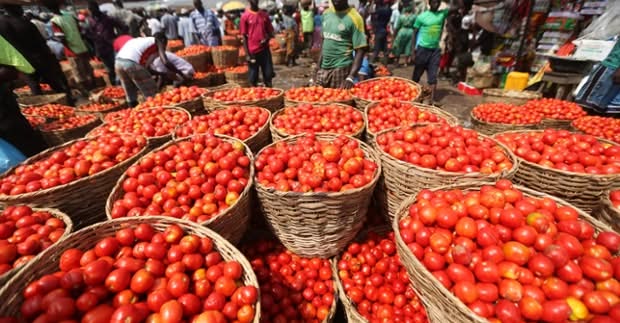With barely two days to the Eid-el-Kabir festivities, prices of key perishable food items such as tomatoes, peppers, and onions have surged significantly in markets across the country, following the recent collapse of the Mokwa Bridge in Niger State, a key transport corridor linking the northern and southern regions of Nigeria.
The tragic incident, which occurred last Thursday after a devastating flood swept away the bridge, has not only disrupted major transportation routes but also left hundreds of trucks laden with foodstuffs stranded in Mokwa town. The collapse, which reportedly claimed over 200 lives and left many more missing, is now compounding an already strained food supply chain ahead of one of Islam’s most celebrated religious events.
According to findings, the disruption has resulted in sharp price increases in perishable food commodities, especially in states like Nasarawa, Bauchi, and Lagos, where markets heavily depend on northern farm produce. In Lafia, the Nasarawa State capital, a basket of tomatoes that sold for between N10,000 and N13,000 last week now goes for as high as N25,000, depending on quality.
Traders and farmers are counting their losses. Alhaji Isa Aliyu, National President of the National Onion Producers, Processors and Marketers Association of Nigeria, confirmed on Wednesday that several trucks conveying onions to the South-West have been stuck in Mokwa for days. He raised concerns about spoilage, given the perishability of the goods and the high cost of logistics.
Corroborating this, Alhaji Umarun Basiru, Chairman of the Tomatoes Traders Association in Kebbi State, disclosed that at least 15 trucks transporting tomatoes and peppers from the state—worth an estimated N250 million—are currently stranded due to the bridge collapse. “This unfortunate incident has added salt to injury. The prices were already high due to inflation and insecurity in farming areas; now this has made the situation worse,” he lamented.
Dealers like Aminu Aliyu, who operates out of Bauchi, stressed the impact on market prices and on the common man. “When trucks get stuck and perishables can’t move, scarcity sets in and prices shoot up. This is the reality now. It is the poor that bear the brunt,” he said.
Farmers are also expressing concern over the economic implications. In Gombe State, tomato and pepper farmer Garba Yusuf explained how the collapse is affecting regional food logistics. “Normally, we send our produce to major cities like Kano, Abuja, and Lagos. With the Mokwa route blocked, our vehicles are left idle. We are watching our produce rot while preparing for heavy losses,” he said.
Eid-el-Kabir, commonly known as Sallah, is a period of intense demand for food items due to the celebratory nature of the festival, which involves feasting and large family gatherings. This has further amplified market pressures, as demand soars while supply is cut off.
From Sokoto, the story is similar. Alhaji Murtala Bawa, Chairman of the Sokoto State Association of Foodstuffs Sellers, revealed that the association is still collating data on losses, but preliminary reports indicate that perishables worth millions of naira have already gone bad due to delays in transit.
Meanwhile, traders at Lafia’s Main Market and the Kasuwa Tomatoes Market continue to appeal for government intervention. Ibrahim Muhammad, Secretary of the Kasuwa Tomatoes Market, urged the Federal Government to take swift action to restore connectivity and provide emergency support to affected traders.
“We are doing our best to prevent a total collapse of supply, but without government assistance, the situation may spiral out of control,” he warned.
As it stands, market forces are in full effect: with limited supply and increased demand driven by the festive season, the prices of perishables are climbing steeply, and the economic pain is spreading fast, from farm to table.


